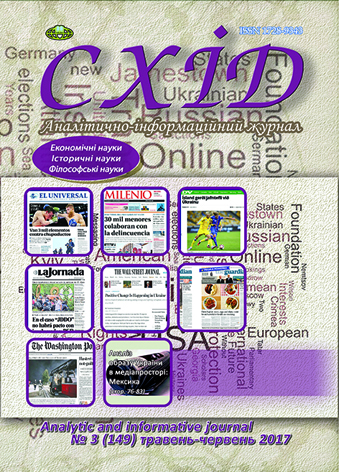Problems and prospects of financing the rehabilitation of hydropower plants project by the World Bank in Ukraine
DOI:
https://doi.org/10.21847/1728-9343.2017.3(149).108101Keywords:
investment projects, financing energy, The World Bank, international financial institutionsAbstract
The article deals with the financing of investment projects by the World Bank, especially the rehabilitation of hydropower plants. It is noted that cooperation with Ukraine World Bank launched since 1992. The World Bank develops and finances projects at the request of the Government of Ukraine. After evaluating the project and the terms of the loan are following the negotiations, the approval of the Board of Directors and the signing of the agreement. The funds of the World Bank in Ukraine are on the system of financing and investment projects. The content system projects is to change the conditions and rules of certain sectors of the public administration or industries. The aim of the investment projects is the technical reconstruction of some existing businesses a particular industry or region, creating new companies or provide funds to replenish the working capital of enterprises. This clearly defined list of goods, services and works to be procured through the World Bank loan. The paper conclusions on the results of the project of rehabilitation of hydropower plants.
SuccessinitiatedenergyreforminUkraineislargelydeterminedbytheefficiencyoftheinvestmentpolicy, including attracting loans from international financial organizations. On receipt of credit, including the World Bank, depend on the possibility of upgrading technologically obsolete and worn-out fixed assets of the energy sector and problems olving reduce country's energy dependence, improve energy efficiency and reduce the impact on the environment. In turn Hydropower Rehabilitation project funding by the World Bank Ukraine will ensure uninterrupted operation of hydropower plants and have a positive impact on the environmental and energy security.Downloads
References
Bilorus, O.G. (2014), Hyperfinancialization of the global economy and its global problems and consequences, Finance of Ukraine, 10, pp. 24-31 (ukr).
Galchinsky, A.S. & Yeshchenko, P. S. & Palkin, Yu.I. (2009), Fundamentals of Economic Knowledge, Vyshia Shcola, Kyiv, 543 p. (ukr).
Kolosova, V.P. (2015), Institutional Factors and Consequences of Reforming International Financial Organizations, Finance of Ukraine, 10, pp. 32-52 (ukr).
Kolosova, V.P. (2000), Lending to Ukraine’s economy by international institutions, Finances of Ukraine, №2, pp. 22 (ukr).
Khoroshkovsky, V.I. (2002), Cooperation of Ukraine with International Financial Institutions: Evolution, Theory, Practice, Intelligence, Kyiv, 424 p. (ukr).
Tsigankova, T. M. & Olefir, A.O. & Fursova, O.V. and others (2003), Global Trade System: Development of WTO Institutions, Rules, Instruments, Kyiv National Economic University, Kyiv, 660 p. (ukr).
Official World Bank website, available at: http://www.worldbank.org/
HYDROPOWER REHABILITATION PROJECT (LOAN UA 4795-UA AND 7791-UA), available at: http://www.worldbank.org/
Public-Private Partnerships in the Context of Public Investment Management in Ukraine: An Assessment (2016), World Bank, January. DOI: 10.1596/24772.
Ukraine Country Environmental Analysis (2016), World Bank, January. DOI: 10.1596/24971.
Lerman, Zvi and Csaki, Csaba (2000), Ukraine: Review of farm restructuring experiences, World Bank Technical Papers, January. DOI: 10.1596/0-8213-4666-0.
Downloads
Published
How to Cite
Issue
Section
License
Copyright (c) 2017 Ivan Kolosov

This work is licensed under a Creative Commons Attribution-NonCommercial-NoDerivatives 4.0 International License.
1. Authors bear responsibility for the accuracy of facts, quotations, numbers and names used.
2. Manuscripts are not sent back.
3. The publisher does not always agree with the authors' opinion.
4. The authors reserve the right to authorship of the work and pass the first publication right of this work to the journal under the terms of a Creative Commons Attribution-NonCommercial-NoDerivatives 4.0 International License. This license allows others to distribute (copy) the published work for non-commercial purposes, provided there is mandatory attribution to its authors and a link to the first publication in our journal.
5. The authors have the right to conclude separate supplement agreements that relate to non-exclusive work distribution in the form in which it has been published by the journal (for example, to upload the work to the online storage of the journal or publish it as part of a monograph), provided that the reference to the first publication of the work in this journal is included.

